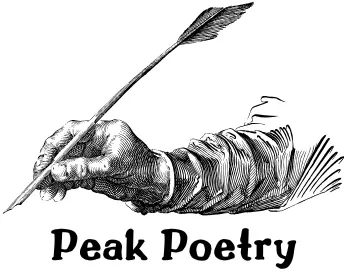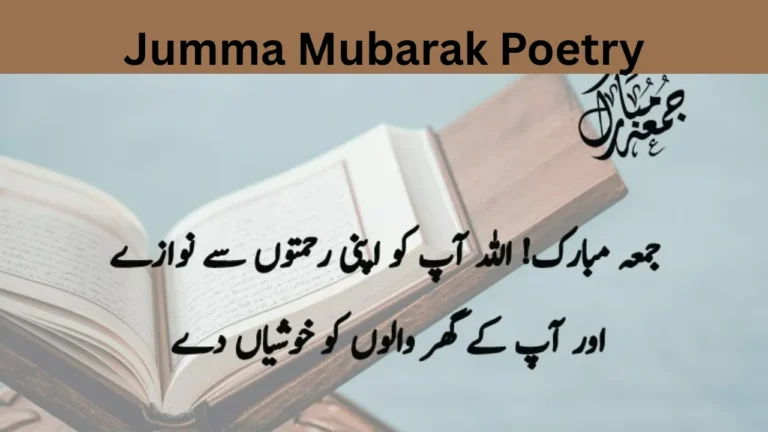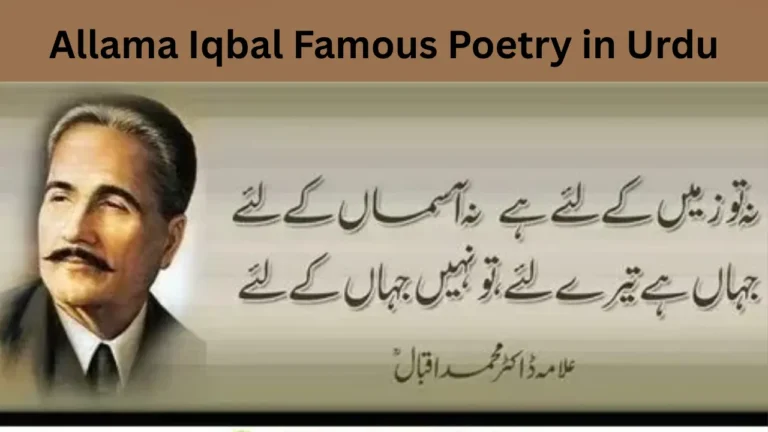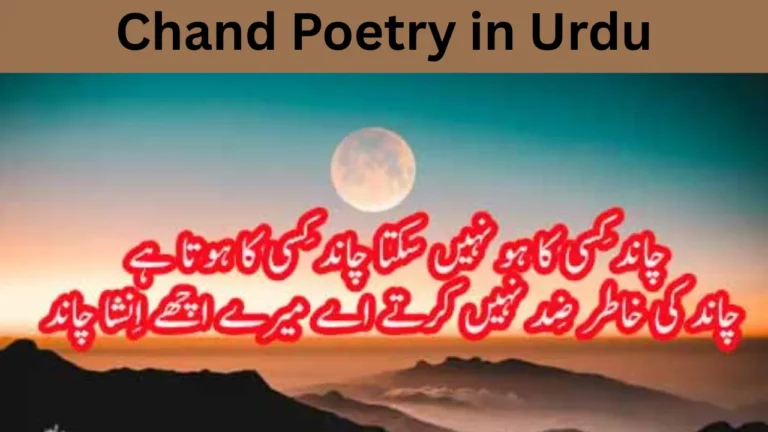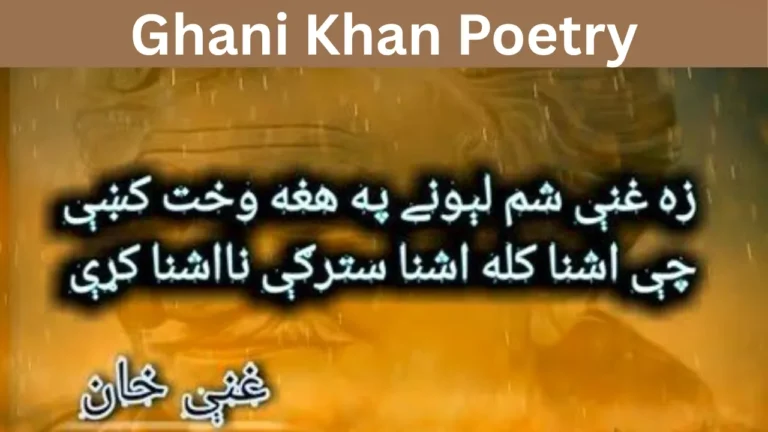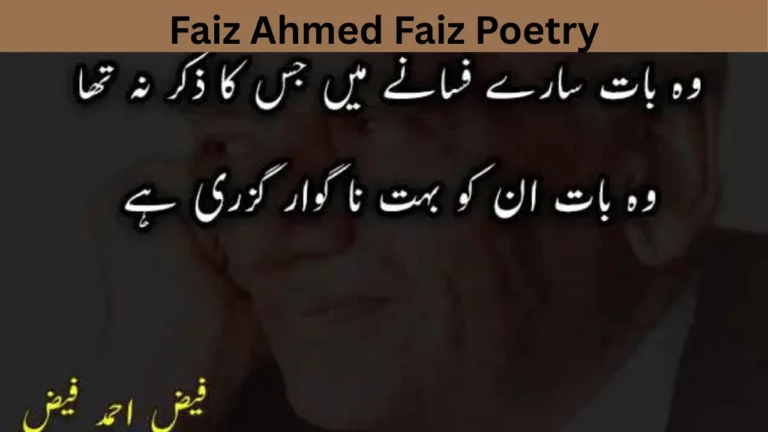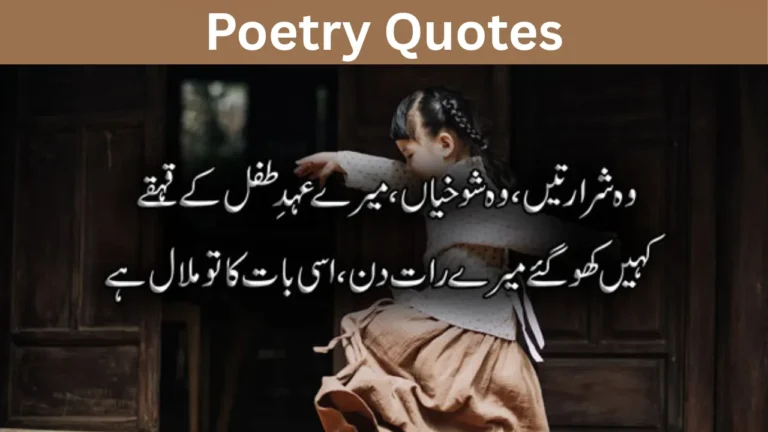14 August Poetry Celebrating the Spirit of Freedom Through Words
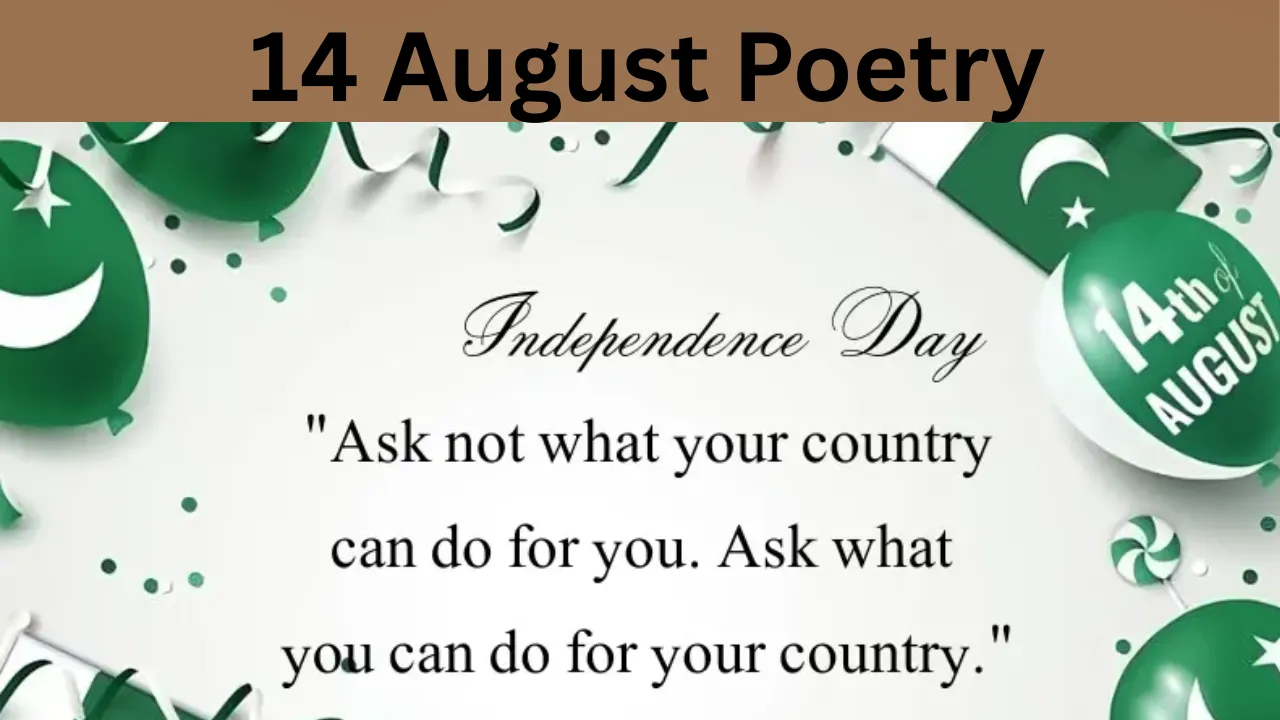
14 August poetry is more than just rhyming lines. It’s a tribute to the soul of Pakistan, echoing the passion, pride, and struggles of its people. Every year, Pakistanis across the globe mark Independence Day with green flags, parades, and—above all—poetry that touches hearts.
Poets use words like colors on a canvas, painting scenes of bravery, unity, and love for the homeland. In fact, the emotional depth found in these verses can be compared to Islamic Poetry: A Spiritual Journey of Faith, Words, and Love, where feelings are turned into sacred expression. Independence Day poems do the same—transforming national love into heartfelt verses.
“Jashn-e-Azadi ka din hai aaya,
Har dil ne Pakistan ko chaaha.
Sabz parcham mein hai roshni,
Jahan hai yeh, wahan hai zindagi.”
The Origins of 14 August Poetry
Pakistan was founded on 14 August 1947 after decades of struggle under British colonial rule. The Pakistan Movement was fueled not only by political leaders and activists but also by poets like Allama Iqbal, whose powerful words inspired hope, unity, and vision.
From the beginning, poetry became a central force in shaping the national spirit. Iqbal’s verses helped imagine Pakistan long before its physical birth. His dream of a separate Muslim homeland came alive not just in speeches, but in lines of Urdu poetry that moved the masses:
“Khudi ko kar buland itna ke har taqdeer se pehle,
Khuda bande se khud pooche, bata teri raza kya hai.”
These words aren’t just historical—they still live in today’s celebrations of 14 August poetry. They are recited in schools, national functions, and cultural events, reminding people that this country was created through vision, courage, and words.
The Purpose and Power of Patriotic Poetry
Why is 14 August poetry still so important today?
Because it captures what textbooks and speeches often cannot—emotion. It gives voice to feelings of pride, loyalty, pain, and hope. It helps people, especially the youth, feel connected to something larger than themselves.
When someone recites a powerful poem about Pakistan, it does more than entertain—it educates, motivates, and unites. That’s why so many events on Independence Day begin or end with a poem, often written by students or local poets.
Let’s feel this power in some short, heartfelt verses:
“Yeh mitti mere khwabon ka nishaan hai,
Har saans mein bas Pakistan hai.”
“14 August hai roshni ka din,
Watan ke liye har qurbani hai mann.”
These verses don’t just speak—they sing of love for the land, for the flag, and for the people who gave their lives for it.
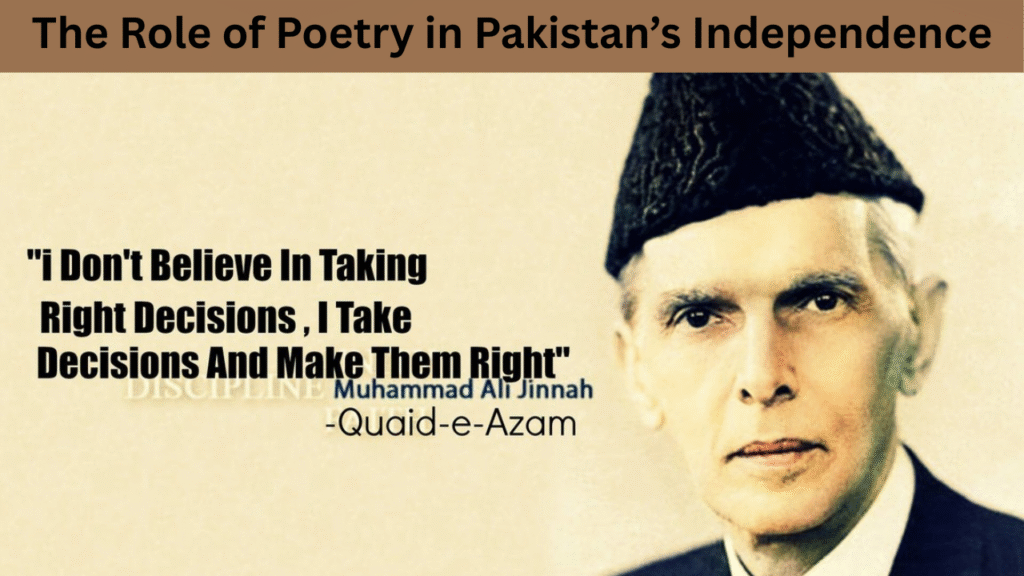
The Role of Poetry in Pakistan’s Independence
Pakistan’s independence on 14 August 1947 was not a random event. It was the result of a long, painful, and emotional journey. Poetry played a huge role in that movement. Great minds like Allama Iqbal used their pens as swords, inspiring generations with hope and a dream for a separate homeland.
Even today, when someone recites 14 August poetry, the feelings are fresh and alive. The poems connect the past with the present, and the words continue to ignite patriotism.
Here’s a powerful couplet from Allama Iqbal:
“Nahin hai na-umeed Iqbal apni kisht-e-veeran se,
Zara nam ho to yeh mitti bari zarkhez hai saaqi.”
It reminds us of the deep connection between hope and the land of Pakistan.
Heartfelt Examples of 14 August Poetry
Let’s explore the real soul of this topic through poetry itself. Here are original verses that express love, respect, and gratitude for the land of the pure:
“Watan ki khushboo se mehka hai aangan,
14 August ka din hai sabse roshan.”
“Sabz parcham lehraye aasman ke paar,
Azadi ke geet gaye har ek bazaar.”
“Khoon se likhi thi kahani jis din,
14 August hai woh roshni ka din.”
“Azaadi ka jashn manayein hum sab,
Pakistan zindabad gayein har lab.”
“Quaid ka paigham hum bhool na jaayein,
Unity, faith, discipline ko hum apnaayein.”
These lines are not just beautiful—they carry history, sacrifice, and national dreams in every word.
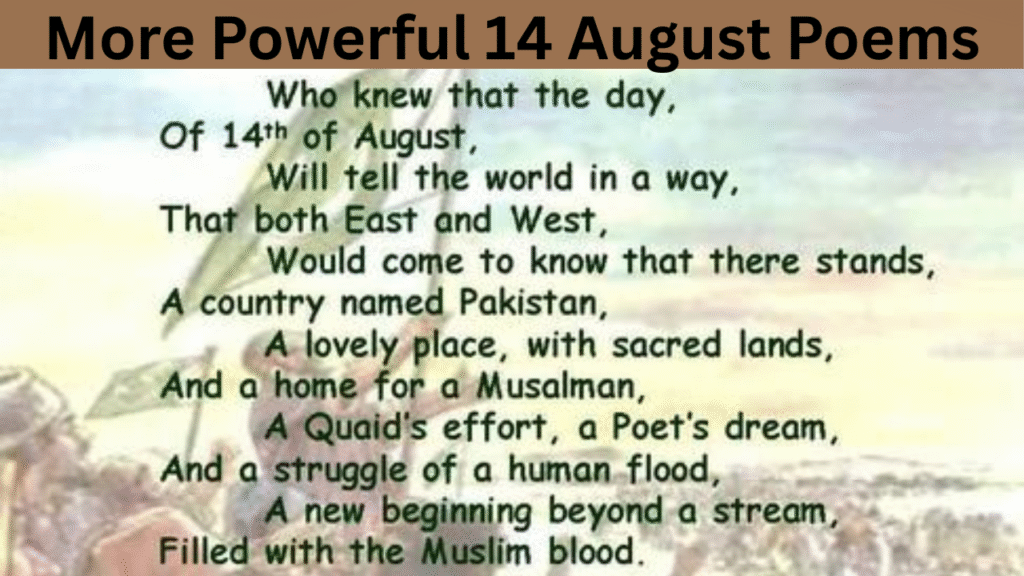
More Powerful 14 August Poems
To keep the rhythm flowing, here’s more 14 August poetry that adds strength to this patriotic blog:
“Jahan mein rahti hai meri zameen,
Wohi hai meri pehchaan ka nishaan.”
“Watan ki mitti se hai pyaar humein,
Uske liye hai jaan bhi qurbaan humein.”
“Sarhadon ke rakhwale tum zinda ho,
Tum se hi to gulshan chamakta ho.”
“Guzri thi aandhiyaan, lekin jhuka nahi parcham,
Azadi ke din pe rahega yeh har dam.”
These poems remind us of the courage and commitment shown by our people. They turn history into song and memory into poetry.
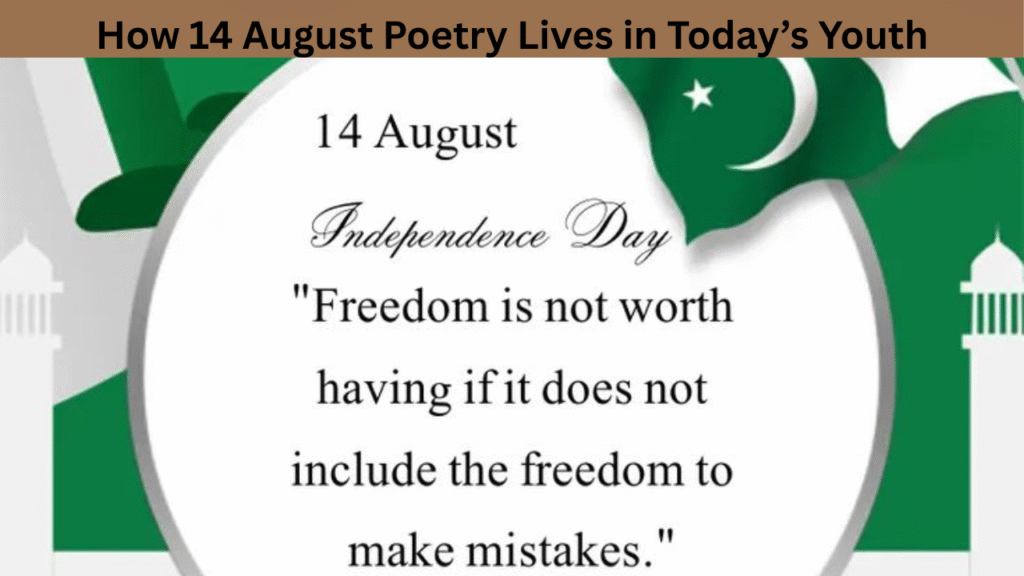
How 14 August Poetry Lives in Today’s Youth
With the rise of social media, the tradition of 14 August poetry has entered a new phase. Young poets now post videos of themselves performing spoken word. Influencers share independence verses with stylized visuals and music.
This new era keeps the old message alive in fresh ways. For many, writing or sharing a short poem is their way of showing patriotism. It’s emotional, easy to relate to, and powerful in impact.
That’s why short formats like English Poetry 2 Lines: Small Verses with Deep Emotions are becoming popular among youth. Even a two-line verse, when written with passion, can touch the heart and go viral.
“Main hoon nayi soch, nayi raah ka nishaan,
Par Pakistan meri pehchaan, mera armaan.”
Translation: I am the mark of a new path and a fresh thought,
But Pakistan is my identity, my dream deeply sought.
“Main phone se likhta hoon jazbaat-e-watan,
Mujh mein bhi chhupa hai ek jawan sipahi har dam.”
Translation: I type my love for the land into my phone,
A young soldier’s spirit inside me has grown.
“Main sirf flag lagata nahi hoon gate par,
Main Pakistan likhta hoon apne har word ke art par.”
Translation: I don’t just hang a flag at the gate,
I write Pakistan in every line I create.
The Connection Between Poetry and National Identity
14 August poetry keeps our national identity alive. When people recite or read these poems, they feel closer to the soul of Pakistan. It’s not just about flags or slogans—it’s about emotions tied to the land.
This poetry inspires citizens to be better. It calls for unity, reminds us of the sacrifices of the past, and urges us to protect what was earned with blood and tears.
In schools, children learn these poems and carry them for life. Teachers recite them during morning assemblies. News anchors share them during broadcasts. And poets perform them at cultural events.
These poems are also shared widely on WhatsApp and Facebook. Their simplicity allows everyone to connect.
“Watan ka naam ho lab par to sher ban jaate hain,
Yehi to hai shayari mein qaum ke nishaan chhup jaate hain.”
“Ek shaam ho watan ke naam, ek nazm ho qurbani ki,
Har misra ho awaaz-e-azadi ki kahani ki.”
“Poetry ne diya Pakistan ko ek naya rang,
Har lafz mein chhupa tha aazadi ka sang.”
“Main likhta hoon watan ka naam, toh rooh se awaaz aati hai,
Yeh mitti meri shayari mein khud ko dikhlaati hai.”
“Na sirf kitaabon mein milegi tumhein is mulk ki kahani,
Ek nazm mein bhi milega har shaheed ka qissa purani.”
Final Thoughts
No matter how much technology advances or cultures shift, the tradition of 14 August poetry will continue. Why? Because it is born from emotion, from struggle, from love—and such things never die.
Every poem written for Pakistan is a brick in the wall of its future. Every couplet recited is a flag waving in someone’s heart. Through verses old and new, in Urdu and English, on paper or on screen—patriotism lives in poetry.
So this 14 August, whether you’re waving a flag, attending a parade, or scrolling on your phone—pause for a moment. Recite a verse. Write a line. Share a poem. Because your voice is part of Pakistan’s voice.
And together, that voice says:
“Pakistan Zindabad.”
